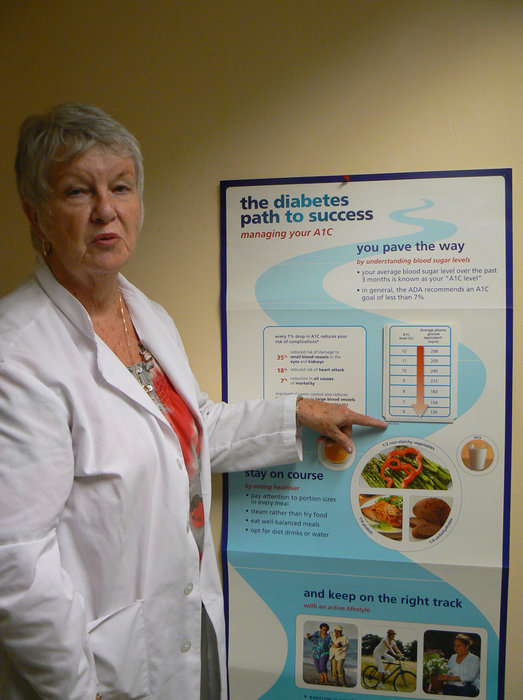Hoboken University Medical Center (HUMC) has launched a new Outpatient Diabetes Program that provides patients with the information, guidance, and the tools that they need to manage the disease. Through one-on-one consultations, group support classes, and follow up led by Maureen Williams, a registered nurse and certified diabetes educator, patients learn how to maintain their overall health and lead a normal life.
Diabetes, which affects over 20 million Americans, is a disease where high blood sugar levels can lead to blurred vision, excess thirst, fatigue, and frequent urination among other symptoms. Diabetes is caused when there is too little insulin and/or resistance to insulin, which is needed by the body to breakdown sugar.
HUMC offers a diabetes support group the last Thursday of each month from 6 p.m. to 7 p.m.
____________
“They are people first,” said Williams. She works Tuesdays and Thursdays out of HUMC and Monday, Wednesday, and Friday out of Bayonne Medical Center, counseling individuals with diabetes. “They need to be well with their everyday life and managing their blood sugars makes them feel better.”
Williams said that many people learn to live healthy with diabetes.
Her patients are diverse in background and seek educational counseling for a variety of reasons from advice on foot care to feedback on how and what to eat.
“I try to teach so people understand,” said Williams. She said she works with individuals to adjust their daily meal plan according to their interests, habits, and cultural preferences in food.
During a consultation, individuals may learn about self care, how to use their glucose meter, and how to balance their medicine and food so that they are safe.
“It is caring for the whole body,” said Williams.
New tools
“We are lucky today,” said Williams. “There are so many better tools.”
Among the tools available, there is a three month average blood sugar test that measures how well a person is doing over time. Medication may need to be adjusted based on the test outcomes.
“We do something different today like carbohydrate counting,” said Williams.
She said that a specific amount of carbohydrate is recommended with each meal and she demonstrates to patients how much should be on their plate, how to count carbohydrates, and what types of food qualify as a carbohydrate.
“We teach how to read labels so that they can count fiber and measure the amounts of foods,” said Williams. “We teach you safe exercise guidelines.”
She said that many people are scared off by the word exercise but that the requirement is manageable and worked into each individual lifestyle.
Developing understanding
“It is important to me that people not leave my office unless they understand what to do,” said Williams. “I want them to feel good and to know that they can do this.”
Williams said that people face obstacles related to fear, denial, and sadness about having the disease. She noted that some patients share horror stories about what happened to family members or friends that had the disease, but that much has changed that can help prevent severe outcomes.
“Thirty or forty years ago things were different,” said Williams.
Williams became a registered nurse in 1966 after studying at the former St. Francis Hospital in Jersey City, which was owned by the same nuns who ran St. Mary’s, the former HUMC. She became a diabetes educator when her son was diagnosed with the disease at the age of eight.
“I noticed that he was standing at the sink drinking and drinking and drinking,” said Williams. She took him to his pediatrician and found that his sugar was at 350, when the normal level is 60 to 110, and he was hospitalized. After two weeks he hadn’t made any progress. Williams took him to a specialist in Boston.
“Education was the treatment but there weren’t a lot of educators around or people who could help people,” said Williams.
HUMC offers a support group the last Thursday of each month from 6 p.m. to 7 p.m. that is open to all, including family members of people living with diabetes.
“Sometimes it helps to hear other people say what is bothering them and you don’t feel like you are alone,” said Williams.
Patients need a doctor’s referral to have a one-on-one consultation with Williams.
For more information, contact HUMC at: (201) 418-1000.
Adriana Rambay Fernández may be reached at afernandez@hudsonreporter.com.
